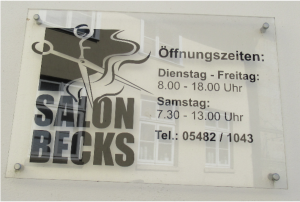119 H: Telling time in German
H: Telling time in German
What time is it? = ‘Wie spät ist es?’ or ‘Wie viel Uhr ist es?’
Uhr = o’clock
die Minute, -n = minute
Telling time in German is quite simple: when someone asks you ‘Wie spät ist es?’ or ‘Wie viel Uhr ist es?’, you answer:
- Es ist (# of hours) Uhr (# of minutes) Minuten.
- 8:10 = Es ist acht Uhr zehn Minuten.
- 11:49 = Es ist elf Uhr neunundvierzig Minuten.
- 15:33 = Es ist fünfzehn Uhr dreiunddreißig Minuten.
Most European countries go by the 24 hour clock, but you only hear or say those higher-than-12 numbers of hours when you are being formal. When speaking informally, you still go by the 12 hour clock:
- 14:20 = Es ist vierzehn Uhr zwanzig Minuten. (formally)
- 14:20 = Es ist zwei Uhr zwanzig Minuten. (somewhat less formally)
Aufgabe 1. Wie viel Uhr ist es? Please answer with a complete sentence. It’s okay to use numbers in the answer. Use a full stop at the end.
- 3:40 _____________________________________
- 4:16 _____________________________________
- 7:25 _____________________________________
- 11:11 _____________________________________
- 15:50 _____________________________________
- 20:08 _____________________________________
- 23:29 _____________________________________
To be even less formal, you can omit the word ‘Minute/Minuten’:
- 8:28 = Es ist acht Uhr achtundzwanzig.
- 16:04 = Es ist sechzehn Uhr vier.
- 17:09 = Es ist siebzehn Uhr neun.
You can also be informal by saying that it is so many minutes ‘past’ (nach = after) or ‘to’ (vor = before) a specific hour:
- 8:25 = Es ist 25 nach 8
- 8:50 = Es ist 10 vor 9.
- Instead of ‘fünfzehn Minuten vor’ you can say ‘Viertel vor’ (quarter to).
- 8:45 = Es ist Viertel vor acht.
- 11:45 = es ist Viertel vor elf.
- Instead of ‘fünfzehn Minuten nach’ you can say ‘Viertel nach’ (quater past):
- 7:15 = Es ist Viertel nach sieben.
- 9:15 = Es ist Viertel nach neun.
Aufgabe 2. Wie viel Uhr ist es? Please answer using the ‘new’ way you just learned. (Please answer with a complete sentence. It’s ok to use numbers in the answer.)
- 22:59. _____________________________________
- 1:20 _____________________________________
You can also use the word ‘halb’ (‘half’ or ’30 minutes’), but online in English where we say ‘half past’, ‘halb’ always means ‘half of the next hour:
- 7:30 = ‘half past seven’, but ‘halb acht’ in German
- 8:30 = halb neun
- 11:30 = halb zwölf etc.
Aufgabe 3. Wie viel Uhr ist es? Please answer using the ‘new’ way you just learned. (Please answer with a complete sentence. It’s ok to use numbers in the answer. )
- 7:30 _____________________________________
When answering the following to questions, always use ‘um’ (at):
- Wann? = When?
- Um wie viel Uhr? = At what time?
- Wann? → um acht Uhr zwanzig Minuten (8:20).
- Wann? → um halb eins (12:30)
- Um wie viel Uhr? → um zwei Uhr dreißig (2:30)
You will find the following two words important when talking about time:
- fängt an = ‘starts’. It means the same as ‘beginnt’
- hört auf = stops/ends. It means the same as ‘endet’
- Wann fängt der Deutschkurs an? = Wann beginnt der Deutschkurs?
- Wann hört der Deutschkurs auf? = Wann endet der Deutschkurs?
Finally, when talking about how long something lasts, use the word Stunde meaning ‘hour’ as ‘length of time’:
Let’s say a movie starts at 8 p.m. and lasts 2 hours. Then you are likely to hear:
- Wann fängt der Film am? > um acht Uhr zwanzig.
- Wie lange dauert [lasts] er? > zwei Stunden.
Aufgabe 4. Answer these questions about Salon Becks (Refer to the image) with short answers:

- Wann öffnet Salon Becks Dienstags?
- Wann schließt Salon Becks Freitags?
- Wie lange ist Salon Becks in der Woche geöffnet?
- Wann fängt Salon Becks Samstags an zu arbeiten?
- Wann hört Salon Becks Samstags auf zu arbeiten?
